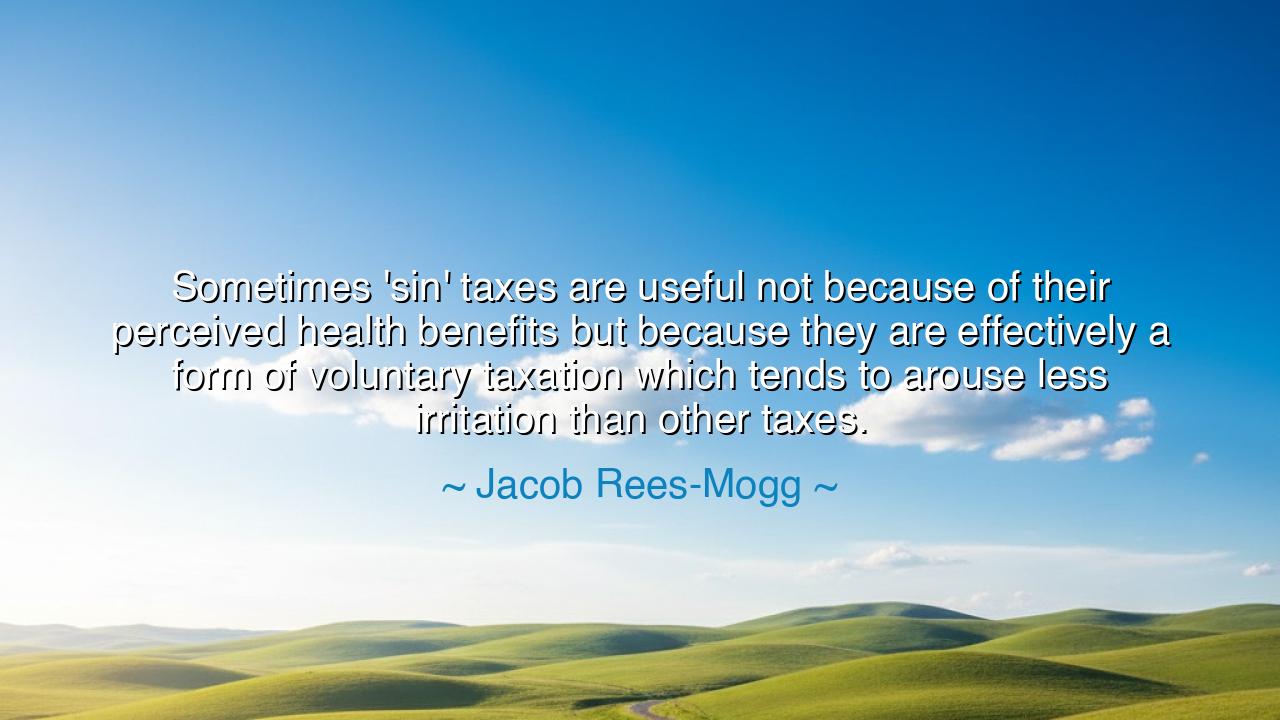
Sometimes 'sin' taxes are useful not because of their perceived
Sometimes 'sin' taxes are useful not because of their perceived health benefits but because they are effectively a form of voluntary taxation which tends to arouse less irritation than other taxes.






The statesman Jacob Rees-Mogg, known for his eloquence and classical mind, once said: “Sometimes ‘sin’ taxes are useful not because of their perceived health benefits but because they are effectively a form of voluntary taxation which tends to arouse less irritation than other taxes.” In these words lies a deep and pragmatic wisdom about both human nature and governance. He speaks not only of economics, but of the eternal balance between virtue and vice, between personal freedom and the laws that bind a society together. His insight reveals that taxation, that most ancient burden of civilization, need not always be born from force—it can, through the cunning of wisdom, spring from choice.
To understand his meaning, one must first understand the nature of a ‘sin tax.’ Such a tax is levied not upon necessity, but upon indulgence—on goods such as tobacco, alcohol, or gambling—those pleasures of the flesh which, while lawful, are often deemed harmful. These taxes, in theory, are meant to discourage excess for the sake of health or morality. Yet Rees-Mogg pierces through this moral veil and speaks plainly: these taxes are powerful not because they make men better, but because they make men willing to contribute to the commonwealth without resentment. For when the burden is tied to one’s own choice—to smoke, to drink, to wager—then the payment feels not like oppression, but consequence. Thus, the wise ruler finds a way to gather wealth for the state without rebellion in the streets.
The origin of this idea stretches far into the past. The ancients understood that the art of governance lies not in coercion, but persuasion. In the days of Rome, the Senate imposed taxes on luxury—on silks, perfumes, and exotic wines—believing that if citizens must indulge, they might at least enrich the Republic while doing so. The people grumbled, but they paid, for their vanity and pleasure outweighed their anger. This is the essence of Rees-Mogg’s thought: that human weakness, properly understood, can be turned toward the good of the community. The wise ruler does not fight vice outright, for vice cannot be wholly eradicated; instead, he channels it, shaping folly into function, and indulgence into order.
Consider also the lesson of King James I of England, who in the seventeenth century placed a heavy tax upon tobacco, calling it “the loathsome weed.” Many cursed the levy, yet they continued to smoke. The treasury swelled, the crown was enriched, and the people—though displeased—found their anger short-lived. For such taxes, though burdensome, are paid in private moments of choice. They do not come as the harsh hand of the state, demanding tribute from every household; rather, they come as whispers in the marketplace, as the quiet toll of pleasure. Rees-Mogg, in his observation, reminds us that this subtlety is the mark of good governance: to lead without cruelty, to raise revenue without rebellion.
There is also a moral undercurrent in his reflection. ‘Sin taxes’, as they are called, carry with them an echo of conscience. They remind the people that freedom is not the absence of consequence, but the acceptance of it. To drink, to smoke, to gamble—these are the choices of free men, but freedom does not erase the price of those choices. In this way, such taxes teach responsibility. They say to the citizen: You may do as you wish, but you shall also pay the cost of your will. Thus, taxation becomes not merely an act of the state, but a mirror of human nature itself.
The ancients would have understood this well. Solon, the great lawgiver of Athens, once said that good laws do not force virtue upon men—they create harmony between the desires of the people and the needs of the polis. Rees-Mogg’s wisdom echoes this philosophy. For in his words, we find a subtle truth about power: the most enduring systems are not those that command obedience, but those that guide it. A people who feel they have chosen their burdens bear them lightly; a people who feel imposed upon rise in fury. The ‘voluntary tax’, as he calls it, transforms resentment into consent, and thus strengthens the bond between ruler and ruled.
Let this be the lesson: understand both your nature and that of others. The wise leader does not seek to perfect humanity, but to work with its imperfections—to shape weakness into strength, appetite into order, and selfishness into service. Likewise, in our own lives, we may learn from this balance. Each indulgence carries a price, whether paid to the treasury or to the soul. The wise man enjoys the world’s pleasures with moderation, mindful that excess, though sweet for a moment, will always demand repayment.
Thus, Jacob Rees-Mogg’s quote is not merely about taxation—it is about the eternal dance between liberty and responsibility, pleasure and restraint. It teaches that the art of leadership, and of life itself, lies not in denying human desire but in understanding it, guiding it, and transforming it into something constructive. For when choice itself becomes the path to order, when the hand of governance moves through wisdom rather than force, then harmony is achieved—and even the paying of taxes becomes an act not of rebellion, but of consent.






AAdministratorAdministrator
Welcome, honored guests. Please leave a comment, we will respond soon